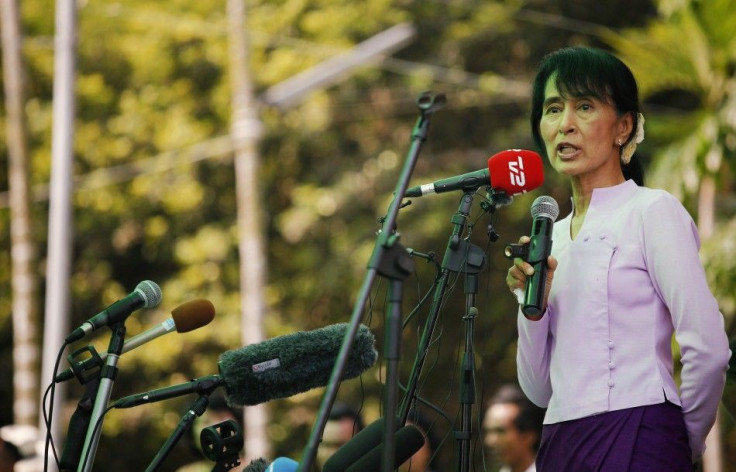Aung San Suu Kyi Arrives In US, As Myanmar Frees More Than 500 Prisoners

Myanmar opposition politician and democracy activist Aung San Suu Kyi arrived in Washington, D.C. on Monday for a 17-day visit to the United States.
Her schedule is packed with meetings and speeches in cities all across the country. She will meet with Burmese communities in Washington D.C., New York City, Fort Wayne, Ind., San Francisco and Los Angeles. She will also meet with Secretary of State Hillary Clinton and several leading politicians in the U.S. Congress.
The White House has not yet confirmed whether Suu Kyi will sit down with President Barack Obama, but sources on Capitol Hill told Foreign Policy that First Lady Michelle Obama invited Suu Kyi to stay a night in the White House, where a dinner in her honor would be held. No specific date was mentioned.
Barring scheduling conflicts, a meeting with Obama is likely considering Suu Kyi's popularity in the United States. A photo-op with her would reflect favorably on the president's foreign policy experience ahead of the general election in November.
Suu Kyi will also accept several awards, including a Congressional Gold medal, a Global Citizen Award from the Atlantic Council, and an Asia Society Global Vision Award.
This will be Suu Kyi's first visit to the United States in decades, though she has spent a considerable amount of time there in the past. The L.A. Times reports that she worked as an intern for the United Nations in New York City from 1969 to 1971, just after she had obtained her undergraduate degree from Oxford University in England.
Suu Kyi later moved back to England, where she lived for several years before heading back to Myanmar in 1988. It was then that she got swept up in pro-democracy protests, emerging as a leader in the movement and founding the National League for Democracy party, or NLD. Her calls for justice and democracy landed her under house arrest, and she was stuck in Burma until her final release in 2010.
She now leads the NLD in Myanmar's parliament and has become an internationally renowned figure.
Under current President Thein Sein, Myanmar is slowly liberalizing. But after years of political repression, the turnaround is slow and human rights abuses still occur. There are hundreds of political prisoners being detained in Myanmar; most estimates range from 330 to 500.
On Monday, the government announced it would release 514 prisoners; it is unclear how many of those are political prisoners.
Suu Kyi's trips abroad serve to involve international actors in Myanmar's struggle. Her current visit to the United States may result in an easing of U.S. sanctions, perhaps on the condition that the Myanmar government addresses certain human rights problems.
Thein Sein himself will visit the United States later this month to attend annual gathering of world leaders at the United Nations in New York City.
© Copyright IBTimes 2024. All rights reserved.






















